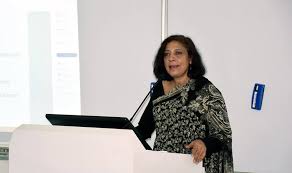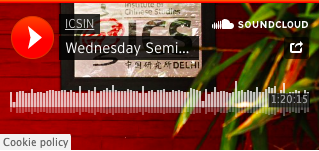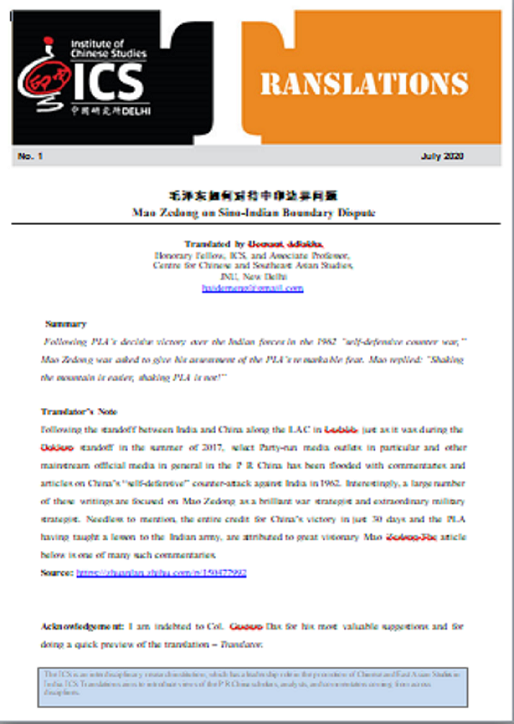 |
 |
 |
| |
| Sinology, Chinese Studies to a Clash of Civilizations: Studying China in Europe |
|
Dr. Ravni Thakur
Wednesday Seminar | Zoom Webinar | 2 September 2020
|
| |
|
This webinar explored two paradigms that have influenced the study of Chinese history and society in Europe - seeing China as a ‘civilization’, and seeing China as a ‘nation-state’. The former involves the emergence of Sinology in European academia and the movement away from early missionary records and writings to the study of China as an academic subject located in Universities. This is the classic phase, often dubbed Sinology and dominated by Confucian studies, philology and textual histories. The emergence of the nation-state as a unit corresponds to the emergence of post-colonial societies and includes the self-perception of ‘imagined nationhood’ of these new States. This is the second framing of China; concrete studies of China’s nation-building process that share commonalities with other development processes. Area Studies became the norm, allowing for micro-level studies of China’s Communist politics, society and economy. This was necessarily a geopolitical framing and remains so even after China’s opening up post-1978. Today, one again notes the emergence of a ‘civilization-based framing’ of China. This has to do both with Europe’s own search for unity and commonality of civilization, the European Union. It also has to do with the rise of China and its own push for a return to nationalism anchored in ‘civilization exceptionalism’ as opposed to just a modern political nation-state. Its rise to power is being seen as a civilizational challenge to Western thought and political institutions and is an intellectual challenge.
. |
| |
|
|
 |
| |
| India and China – Duo incommode vicinorum (Two Uncomfortable Neighbours) |
|
Dr. Raviprasad Narayanan
Wednesday Seminar | Zoom Webinar | 9 September 2020
|
| |
|
The Galwan valley fracas between India and China poses many conundrums to the bilateral relationship. This latest potential escalatory instance reveals, rather bluntly, China, expressing through force effectus primatum tenens (effect of primacy holding) in a geographically strategic sphere. China’s ‘adventurism’ on the LAC with India coincides with aggressive intent witnessed in the South China Sea to disregard regional multilateral institutions (ASEAN) and international covenants like the UNCLOS. When the two largest countries of Asia squabble, it leads to many interpretations with respective statist views dominating and other views considered irrelevant. The Galwan valley clash ought to be seen as multi-layered introspection being made by China, bilateral covenants and international law being anomalies to a country wanting to script an entirely new paradigm supplanting existing norms and relative order. This talk strives to decipher existing and newer anomalies in the India-China bilateral.
. |
| Watch> |
|
|
.jpg) |
| |
| Tanaka Shozō (1841-1913) and Early Meiji Democracy |
|
Brij Tankha
Wednesday Seminar | Zoom Webinar | 16 September 2020
|
| |
|
The mid-nineteenth century saw the Meiji government adopt a wide array of new institutions and laws to become a modern nation-state; central to these was the promulgation of the Meiji constitution in 1889. This talk looked at Tanaka Shozō, politician and political activist, and his ideas about constitutional monarchy as a way to think about the adoption of democratic ideas and institutions in Japan and other parts of the world. Shozō and his contemporaries grappled with new ideas about society, economy, and politics using the rich vocabulary of their heritage and drawing upon earlier popular struggles to think and act in new and modern ways. The talk focused on two aspects in particular: his conception of democracy and his ideas about who creates knowledge. Shozo confronted the problems that government policies were creating and this struggle points to the ways democratic ideas and institutions were not just borrowed models, but shaped by political practice.
. |
| Watch> |
|
| |
.jpg) |
| |
| Implications of China-US Competition in the Digital Age |
|
Dr. Yan Xuetong
Special Lecture | Zoom Webinar | 18 September 2020
|
| |
|
China-US competition in the digital age differs from US-Soviet rivalry during the Cold War. The competition between them is driven by technology superiority rather than ideological expression. Therefore, it will be less possible for them to fall into proxy wars. In the digital age, major powers will accumulate wealth by developing a digital economy, and their national security will rest heavily on cybersecurity technology. China and the US will compete for digital superiority by the scientific invention, which is based on producing more scientists and engineers than the other side. For the sake of global digital influence, China and the US will compete for international digital markets and political friends. Because East Asia will have the largest share of the global digital economy, it will be the core region of China-US competition. East Asia will hence become the region that replaces Europe as the world centre within the next ten years. Faced with China-US digital bipolarity, most countries of the world will adopt a hedging strategy toward China and the US. China and the US will likely respond to this situation according to every country’s policy on electronic communication technology. That is to say, every country's attitude toward China and the US’s digital technology will play a crucial role in bilateral relations. The world will not witness a new Cold War but a digital age, where policymakers are tested by a grand new situation in human history.
. |
| Watch> |
|
|
.jpg) |
| |
| The Myth of Chinese Capitalism: China’s Troubled Transition from Factory of the World to Superpower |
|
Dexter Roberts
Wednesday Seminar | Zoom Webinar | 23 September 2020
|
| |
|
As discussed in his new book "The Myth of Chinese Capitalism", Dexter Roberts described how surging income inequality, an unfair social welfare system, and rising social tensions block its continued economic rise with implications for companies and countries around the world. He discussed how China is struggling to leave behind its "Factory to the World" growth model, and include its hundreds of millions of left-behind migrant workers into a more innovative, consumption-driven economy and why that means China may not become the superpower the world expects. He also discussed how COVID-19 has exacerbated the already huge social disparities in China further complicating its ongoing economic transition and putting it at risk of falling into the middle-income trap. He discussed the difference between decoupling versus global supply chain diversification and how this affects countries like India, and what are the implications of a Trump administration turning its back on engagement while a Xi Jinping-led China is determined to pursue a “wolf warrior” assertive approach to the world.
. |
| Watch> |
|
|
 |
| |
| India’s China Challenge |
|
Ananth Krishnan
Wednesday Seminar | Zoom Webinar | 30 September 2020
|
| |
|
In this seminar, Ananth Krishnan discussed his new book, "India's China Challenge", a work of reportage based on his nine years in China as a reporter for The Hindu and India Today. He explored how China's internal political and economic transformations over the past decade have shaped its relations with India. As he describes in the book, India faces a four-fold China challenge: a political challenge of dealing with a one-party state that is looking to increasingly shape global institutions in line with its values; the economic challenge of both learning from China’s remarkable and unique growth story and navigating a lopsided trading relationship; the diplomatic and military challenge of managing an unresolved border and a complicated bilateral relationship; and finally, the challenge of history, of dealing with a still unresolved boundary dispute and the memory of a traumatic war. In this talk, he focussed on the changing political landscape in China under Xi Jinping, from the centralisation of power to the Party's turn to nationalism; China's changing diplomacy in the Xi era, and on China's emergence as a global tech power, and he will examine how these trends are impacting relations with India.
. |
| Listen> |
|
|
| |
 |
.png) |
| CHINA REPORT |
| Volume 56 | Issue 3 | August 2020 |
| |
| Demographic debates in the decades following the 1960s have shaped much of the discourse on population ageing across the world. This paper by Kavita Sivaramakrishnan traces these discourses and research agendas that led to the understanding of demographic transitions in the developed and developing world. The policies were mostly articulated by demographers from the US and ageing was seen more as a challenge for the West. |
| Read more >> |
|
|
 |
| ICS ANALYSIS PAPER |
| |
India’s view on growing Chinese Engagement in Bangladesh
|
| Sayantan Haldar | Issue No. 118 | September 2020 |
| |
| China’s growing engagement with Bangladesh has necessitated a reflection on how India views Beijing’s growing influence in a region India considers within its sphere of .. |
| Read more >> |
|
|
 |
| ICS OCCASSIONAL PAPER |
| |
India’s Envoy to China 1961-63 P K Banerjee’s China Days
|
| Kishan S Rana | Issue No. 57 | September 2020 |
| |
| This essay is based on P K Banerjee’s (1917–2003) book, My Peking Memoirs of the Chinese Invasion of India (Banerjee 1990), published 14 years after he.. |
| Read more >> |
|
|
 |
| ICS OCCASSIONAL PAPER |
| |
The Masked Gendered Profile of the World Exposed During the Covid-19 Era: Comparing China and India
|
| Usha Chandran | Issue No. 58 | September 2020 |
| |
| The Covid-19 pandemic and its impact bear a critical turning point in the history of humankind, demanding a retrospect on preparedness, a relook on reality and a.. |
| Read more >> |
|
|
 |
| ICS OCCASSIONAL PAPER |
| |
A Study of Colonial India’s Border Making Project vis-à-vis China (1890-1947)
|
| Vinod C Khanna | Issue No. 59 | September 2020 |
| |
| This Occasional Paper is based on a research project which looked at various aspects of how the British colonial rulers addressed the issue of defining India’s .. |
| Read more >> |
|
|
 |
| ICS OCCASSIONAL PAPER |
| |
Karl Marx and the Taiping Rebellion
|
| Anandita Thakur | Issue No. 60 | September 2020 |
| |
| This article attempts to understand Karl Marx’s position on the Taiping Rebellion- by itself, and within his larger evolving discourse of the Asiatic mode of production.. |
| Read more >> |
|
|
 |
| ICS TRANSLATIONS |
| |
Chinese View: Indian Army Illegally Crosses LAC again, Occupies Chinese Territory
|
| Hemant Adlakha | Issue No. 09 | September 2020 |
| |
| On 31 August, the Indian army broke the consensus reached at previous multilevel talks between the two sides and once again illegally crossed the boundary line on the South Bank of the Pangong.. |
| Read more >> |
|
|
 |
| ICS TRANSLATIONS |
| |
Moon Chung-In: How China Can Avoid a “New Cold War?”
|
| Vyjayanti Raghavan | Issue No. 10 | September 2020 |
| |
| Can China win the hearts of the world through the moral leadership superiority over the United States? Looking back on China’s attitude towards South Korea.. |
| Read more >> |
|
|
 |
| ICS TRANSLATIONS |
| |
Girlsonly: A One-time resistance against gender discrimination in China’s University Entrance Examination system
|
| Hemant Adlakha | Issue No. 11 | September 2020 |
| |
| This years’ 高 考 (gāokǎo) or University Entrance Examination season in China produced an unusual thing on the country’s social media – a “Girlsonly” voluntary organization, which offered to answer all queries related to the examination, received widespread attention. “Girlsonly” tried to use more.. |
| Read more >> |
|
|
| |
| ICS BLOGS |
| |
| The ICS Blog is a platform for an open dialogue that aims to inform and enlighten, especially young scholars and analysts on contemporary issues related to China and East Asia. |
| |
|
|
|
|
|
|
|
|
|
|
| |
 |
| |
|
| |









